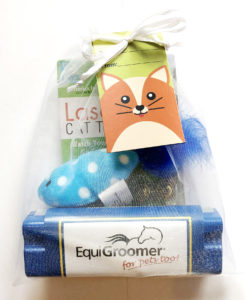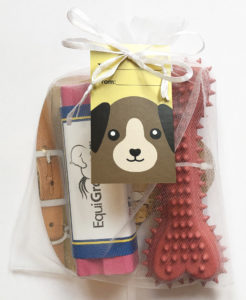Welcome to the second part of keeping your pet healthy, happy, and safe this winter!
This new post focuses on protecting the well-being of our cats and horses.

The EquiGroomer Gift Bag is the perfect holiday gift for the pets and pet lovers in your life!
Winter’s cold and dry air can lead to dry and itchy skin for your pet. Regular grooming helps stimulate and distribute natural oils in their skin.
The EquiGroomer offers easy brushing with NO pulling, discomfort, or damage to your pet’s topcoat or skin.
For individual or bulk orders, call 860-573-0604 or click here to send us an email.
As we mentioned in our first blog (protecting dogs), our pets depend upon us to ensure their health, comfort, and safety. Despite their fur coats, our pets are still challenged by the cold and wet of winter.
It’s critical to educate ourselves about the winter challenges for our pets. Keep reading to learn the tips for protecting both cats and horses during the winter months.
The Rules of Winter: Cats
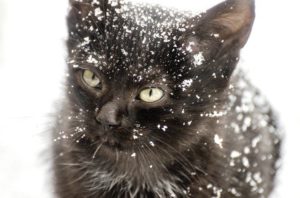 If you allow your feline to roam outside during the winter months, always watch the time (keep it short) and monitor their reactions to the cold. Do not let them out during the coldest times of the day or night.
If you allow your feline to roam outside during the winter months, always watch the time (keep it short) and monitor their reactions to the cold. Do not let them out during the coldest times of the day or night.
Domestic felines (as opposed to feral felines) do not have coats to adequately protect them in the winter months.
- Never leave your family cat outside all winter (even with a shelter).
- Frostbite: Cats are highly susceptible to frostbite on their ears, nose, tail, and toes. Affected areas will be pale or bluish-white in color.
 Immediately get your cat to your vet!
Immediately get your cat to your vet! - Hypothermia: If your feline begins to shiver outside, bring them inside immediately to prevent life-threatening hypothermia. Towel-dry them including paws and toes.
Other signs of hypothermia may include unusual anxiety; crying; or lethargy.
NOTE: If your cat does not stop shivering in a reasonable amount of time, call or take your cat to your veterinarian!
- Paws & Toes: Check between the toes for frozen snow or ice, dirt, or
 rock salt (you don’t want your cat licking any de-icing agents or chemicals). Also, check the paws for cracks and cuts. Massage moisturizing petroleum jelly or olive oil into your feline’s paws and between the toes.
rock salt (you don’t want your cat licking any de-icing agents or chemicals). Also, check the paws for cracks and cuts. Massage moisturizing petroleum jelly or olive oil into your feline’s paws and between the toes.
AVOID cortisone cream, tea tree oil, or other essential oils on your cat’s paws without checking with your vet first!
- Lean Protein: If your indoor cat spends regular time outside, feed them more lean protein.
- Dry, Flaky, and Itchy Skin: Add a small amount of olive to the food (less is more to avoid an upset stomach). Using a home humidifier can also help.
- Holiday Risks: During the holidays, remember holly and mistletoe are toxic to cats (and dogs).
The Rules of Winter: Horses
- Shelter: During the winter, horses need access to a barn; or at a
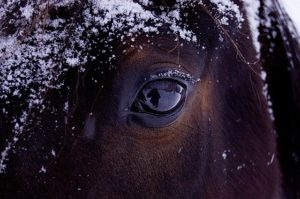 minimum, a three-sided structure to protect themselves.
minimum, a three-sided structure to protect themselves. - Horse Blankets: Well-fitted blankets keep horses warm and dry.
- Blanket horses in potential rain, ice, and/or freezing rain. But never put a blanket on a wet horse.
- Body-clipped equines should be blanketed throughout the winter season.
- Blankets should be used on very young/very old equines or those not yet acclimated to the cold.
- Horses with a body condition score of three or less should always be blanketed.
- Unfrozen Water: Ensure your horse’s access to unfrozen water. Horses need more water during the winter to prevent dehydration
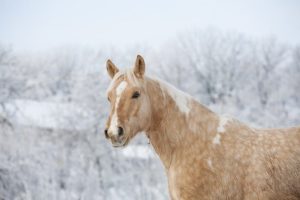 and colic.
and colic.
- Heated water buckets, water heaters, or de-icers will keep water from freezing. The University of Minnesota recommends warm water between 45° and 65° F. (Snow and ice are not adequate sources for water.)
- Body Condition Scoring: Use Henneke’s Body Condition Scoring (BCS) to accurately assess weight changes and overall health during the winter. Click here for the detailed BCS chart for scoring with the scale below.

- Winter Feeding: By feeding your horse more (even unlimited) forage, they will create more heat and efficiently regulate their body temperature.
- Special Care: If your horse requires special care during the summer months, that same care needs to be continued through the winter.
- Equine Skin Care: Horses are prone to skin problems during the winter including ringworm, lice, and mites. To learn more, click here: The Horse, “Winter Skin Problems.”
- Hoof Care: Keep up routine hoof care during the winter; including:
- Trimming: Every 6 to 12 weeks.
- Daily Picking: To remove packed ice or snow.
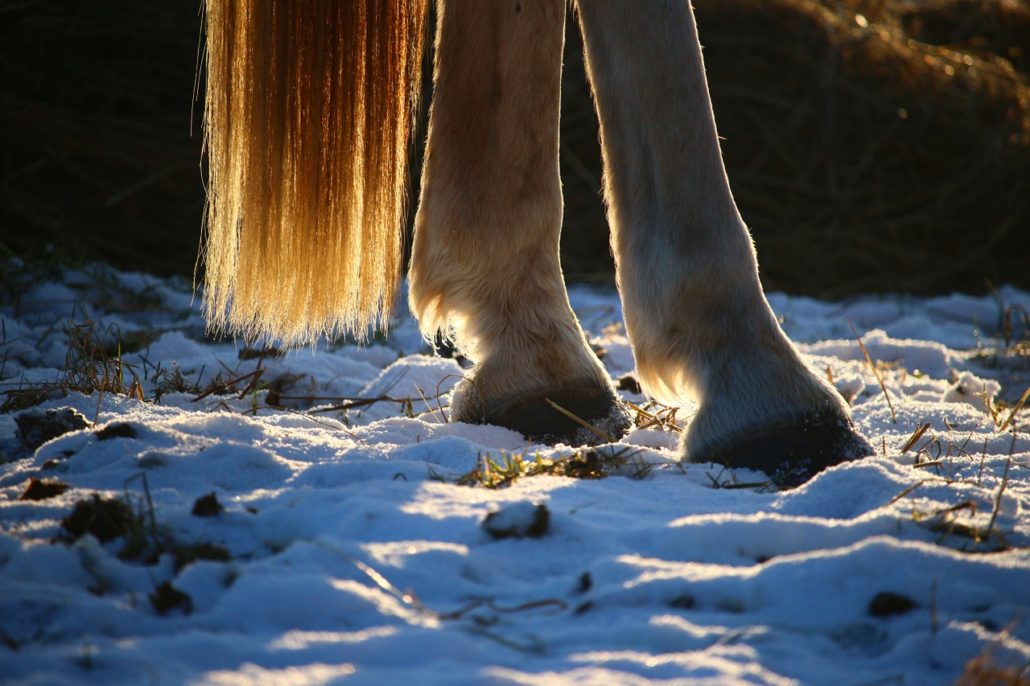
Additional Reading:
Five Ways to Protect Pets This Winter
Tips for Protecting Your Cat This Winter
Top 10 Winter Skin and Paw Care Tips
Caring for Your Horse in the Winter
Tips to Protect Your Horse’s Skin in All Kinds of Weather
Under, Over, or Ideal (Henneke Body Condition Scoring Scale)
Image Credits (in the order shown):
Image by Lenka Novotná from Pixabay
Image by Lisa Johnson from Pixabay
Image by agnesliinnea from Pixabay
Image by filinecek from Pixabay
Image from Blog.smartpakequine.com
Product Images are Courtesy of EquiGroomer


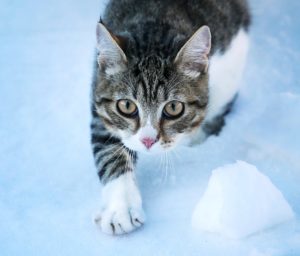 By educating ourselves about the unique challenges of winter, including wet, stormy and freezing weather, pet owners can effectively keep their pet comfortable and safe while also preventing illness – or worse – for their beloved animal companion.
By educating ourselves about the unique challenges of winter, including wet, stormy and freezing weather, pet owners can effectively keep their pet comfortable and safe while also preventing illness – or worse – for their beloved animal companion.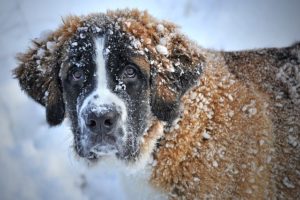 shelter for warmth, safety, well-being and protection.
shelter for warmth, safety, well-being and protection. suffer negative effects from extended exposure to snow, ice and plummeting temperatures. It’s better to go out more often for shorter lengths of time. If your dog begins regularly lifting his paw(s), it’s time to go inside, warm up and check his paws.
suffer negative effects from extended exposure to snow, ice and plummeting temperatures. It’s better to go out more often for shorter lengths of time. If your dog begins regularly lifting his paw(s), it’s time to go inside, warm up and check his paws.

